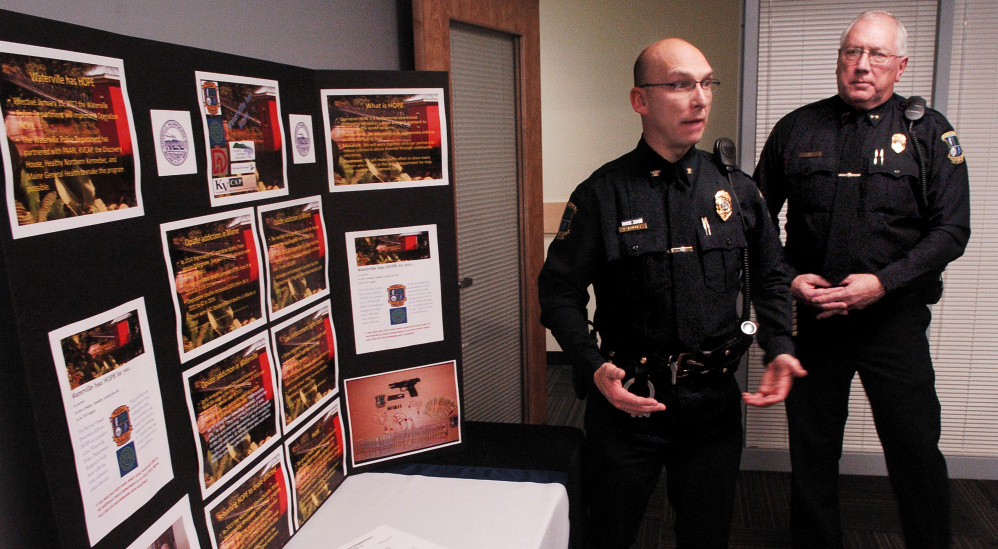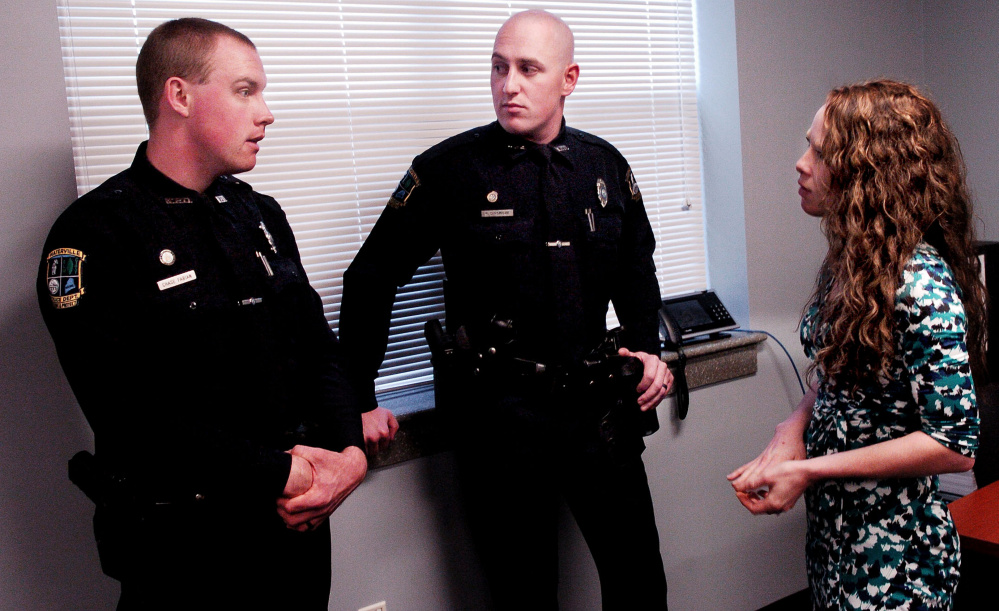WATERVILLE — Police have announced a new program aimed at fighting the growing drug epidemic in the state, which has left an average of one Mainer dead each day in 2016, according to statistics from the state Attorney General’s Office.
Police Chief Joseph Massey and Deputy Chief Bill Bonney held a news conference Wednesday to announce Operation HOPE, which stands for Heroin Opiate Prevention Effort, and is slated to begin Jan. 15.
“The focus of HOPE is on treatment, rather than diversion,” Massey.
Waterville police are partnering with the Police Assisted Addiction Recovery Initiative, PAARI, to provide residential treatment for those who want help. Other partners include the Kennebec Valley Community Action Program, MaineGeneral Health, Healthy Northern Kennebec and the Discovery House of Central Maine, which is a program of Acadia Healthcare.
The department also will train volunteers, who will be called “angels,” to help place those who ask for help with their substance abuse disorder in a PAARI facility.
The majority of drug overdose deaths in Maine – 277 of 286 as of Sept. 30 – were opiate-related.
Bonney also pointed out during the conference that Delta Ambulance in Waterville has noted an 18 percent increase in Narcan use in the first nine months of 2016 compared to all of 2015. Narcan is a brand of naloxone, a nasal spray used to treat narcotic overdoses in emergencies.
In the past few weeks, Waterville police also have seen a 30-year-old man die from an opiate overdose and arrested two people who had 80 grams of fentanyl, a synthetic opiate, Massey said.
“There is no doubt in my mind that opiate addiction has reached an epidemic level in our communities across this country,” Massey said. “That’s why we kind of need to think outside the box and come up with innovative approaches, ideas, initiatives, programs, such as that of HOPE, so that we can treat these addicts and get them on the road to recovery.”
Massey said the department is implementing the program with a “simple philosophy”: If they are able to treat at least one person who goes into recovery, then the program will have been a success.
Operation HOPE has a three-pronged approach, Bonney said: enforcement, education and treatment. Officers will continue to enforce trafficking laws, the department will work with partners to provide education to the community to reduce addiction, and they also will work to place every person who comes to them for help with addiction in a PAARI treatment facility.
“As long as there is a demand, there will be a supply. Therefore, we’re going to attack the demand, restore hope and save lives,” Bonney said.
When the program begins, someone suffering from the disorder can go to the Waterville police station and tell the dispatcher they are there for Operation HOPE. If they have drugs on them, they can turn the drugs in and won’t be charged. An officer will then screen them and, if they meet the qualifications, a volunteer angel will work with them to place them in a PAARI treatment facility, which are located around the country. Nine other police departments in Maine partner with PAARI, including the Augusta Police Department.
To pay for treatment, the department first will look to see whether people have insurance or private money available from their families. If not, it then will look at scholarships that PAARI offers and KVCAP, which is working as a fiscal agent with the police, Bonney said. The police department shouldn’t have to pay for anything beyond potential transportation costs to the facilities, such as a bus ticket, he said.
Waterville police are choosing to focus on treatment, Bonney said, because they want to provide help to those who want to get treatment. Bonney told a story after the conference from part of a journal he read that belonged to someone with substance abuse disorder.
“(The person) wanted to get clean, but that wasn’t realistic for them,” he said. “They weren’t physically able to.”
Bonney also spoke about the stigma that those with substance abuse disorders bear and how his department has had to change its perspective on the issue.
“Obviously, there is a stigma. It’s a philosophy shift in our minds to say ‘someone is suffering from a disorder’ as opposed to ‘that heroin addict,'” he said, adding that part of the problem was the treatment of addicts as “pariahs.”
Officers Chase Fabian and Ryan Dinsmore have been named coordinators of the program and will balance this responsibility with their other daily duties as officers. The department also is going to train officers on how to interact with people who have a substance abuse disorder when they are out in the community, Bonney said.
Copy the Story LinkSend questions/comments to the editors.





Success. Please wait for the page to reload. If the page does not reload within 5 seconds, please refresh the page.
Enter your email and password to access comments.
Hi, to comment on stories you must . This profile is in addition to your subscription and website login.
Already have a commenting profile? .
Invalid username/password.
Please check your email to confirm and complete your registration.
Only subscribers are eligible to post comments. Please subscribe or login first for digital access. Here’s why.
Use the form below to reset your password. When you've submitted your account email, we will send an email with a reset code.